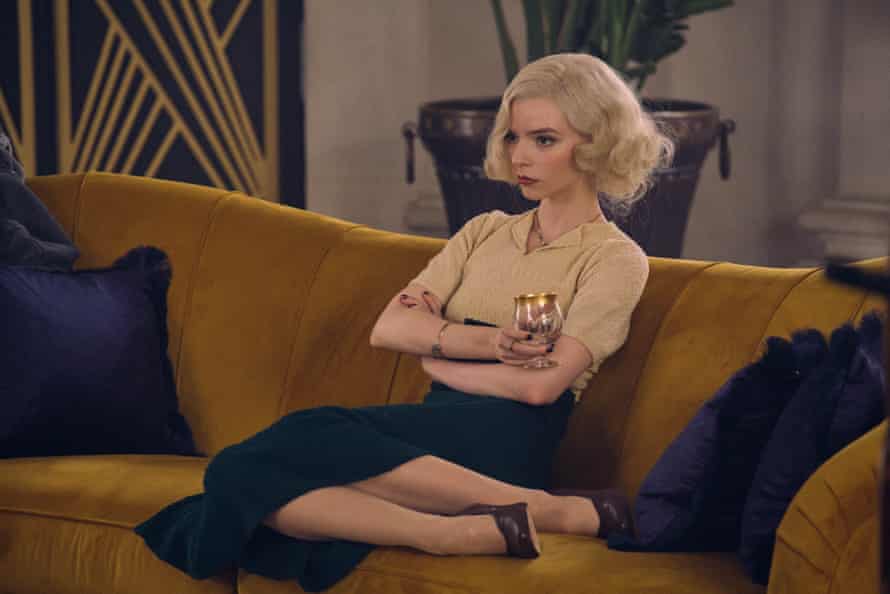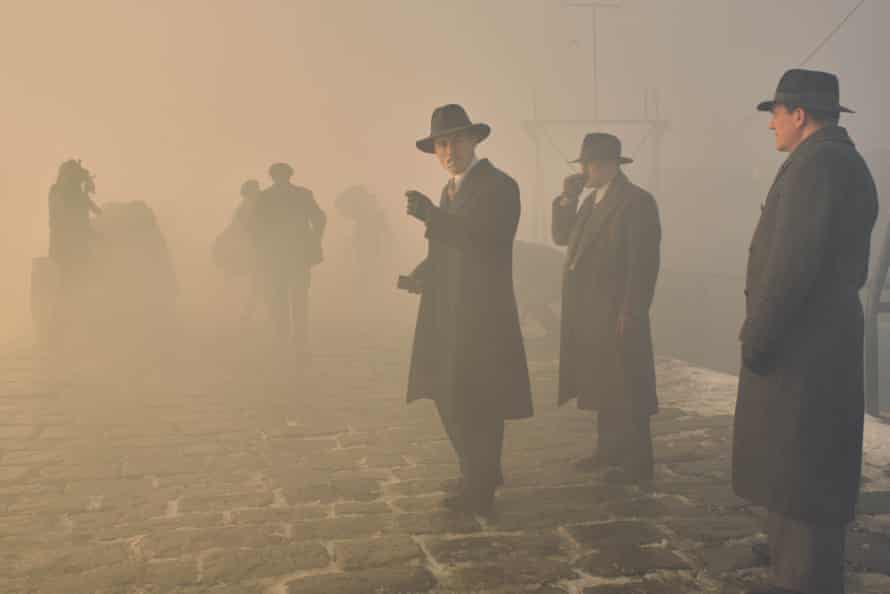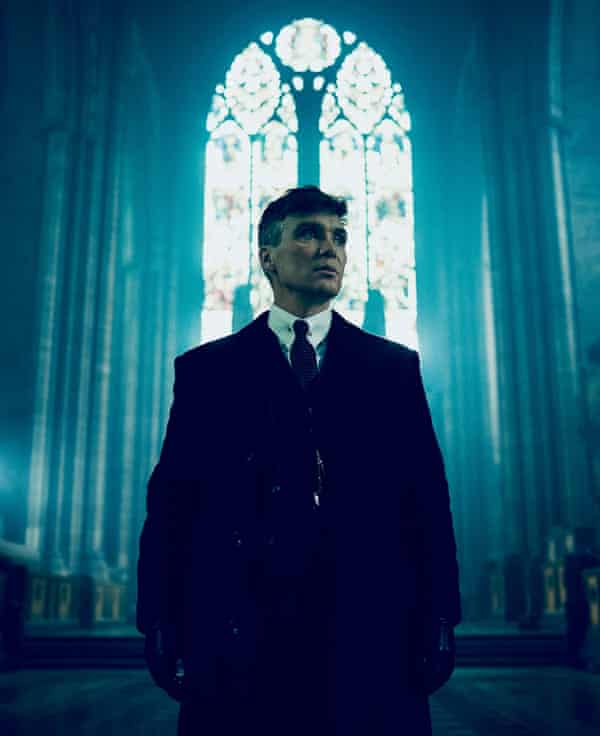Shared from Culture | The Guardian
Steven Knight is no stranger to good reviews. After all, he co-created Who Wants To Be a Millionaire?, received an Oscar nomination for his second movie (Dirty Pretty Things) and is a sought-after screenwriter with credits including Spencer, starring Kristen Stewart as Princess Diana. But when he launched Peaky Blinders nine years ago, the reactions were less positive.
The stylised gangster drama, set in the Small Heath area of Birmingham between the wars but shot like an apocalyptic western, initially left critics sceptical. They couldn’t, however, agree on what they were watching. The Telegraph bemoaned a mood of “unrelenting gloom” whereas this newspaper’s lukewarm review saw the show as “a break from tortured angst and depressing realism”. The New York Times decided the series didn’t “have quite enough juice”. Knight smiles magnanimously. “You can’t pretend a good review isn’t nice,” he says over video call from his London home. “But if you can enter the culture, that’s the greatest compliment.”
Peaky Blinders has done exactly that. Far from running out of juice, it moved to BBC One and Netflix, amassed a large, devoted following including rappers (Snoop Dogg, A$AP Rocky) and Hollywood royalty (Tom Cruise, Brad Pitt) and became a platform for established stars (Cillian Murphy, Helen McCrory, Tom Hardy) as well as thrilling newcomers (Anya Taylor-Joy, Joe Cole, Josh O’Connor). Its influence even permeated fashion. A mere three episodes had been broadcast when Knight first heard that barbers were getting requests for “a Peaky Blinder” – a mop on top with shaved back and sides. “I thought: ‘Bloody hell!’ Because a haircut is a very personal thing.”
This month brings the sixth and final series. “The characters really go through it now,” he says. “They’re up against demons, enemies, fascists. The scale is bigger, and there’s a dark energy. It’s the most jeopardy they’ve faced.” So closely guarded are the show’s secrets that when I allude to the use of a Black Sabbath song, Knight eyes me suspiciously. “How do you know?” he asks. I explain that I was referring to series five, which features War Pigs on the soundtrack, though under the circumstances Paranoid might have been more fitting. “Oh, right,” he laughs, reassured that I haven’t seen – or said – too much.
When we left Tommy Shelby, the soldier turned gangster turned MP played by the glowering Murphy, he was pointing a gun at his own head, his plan to assassinate Oswald Mosley in tatters. The leader of the British Union of Fascists is one of a handful of real-life figures – others include Winston Churchill and Charlie Chaplin – who pop up in the drama like plums in a pudding. “We were shadowing current events in the last series,” says Knight. “The rise of nationalism, populism, fascism: it all started to look eerily relevant.” I mention Tommy’s remark on life as an MP – “For those who make the rules, there are no rules” – and he gives a knowing smile. “Yes, you can have your parties,” he says.
Production on the new series was a fortnight away from starting in March 2020 when the country went into lockdown; even the Shelbys couldn’t shoot and slash their way out of a pandemic. During that time, McCrory, who played Tommy’s indomitable aunt Polly, became increasingly ill; she died from cancer last April. “The issues of production pale into insignificance compared to that,” says Knight. “I’d written a version with Polly, then another one with a bit less Polly. Events overtook her, and us. It was such a terrible, terrible tragedy.” The opening episode of the new series is dedicated to McCrory.
Along with the other female characters, Polly (named after Knight’s great-aunt, who worked as a welder) has been a pivotal figure in a genre that has not always accommodated women. “I wasn’t thinking: ‘Let’s be modern about this,’” he insists. “In the environment I grew up in, women ruled the roost. Many men after the war were quite damaged and spent a lot of time getting drunk, so women controlled the money and organised things. There was even a pub in Small Heath where only female factory workers went in. If a man set foot in there, he’d be assaulted and thrown out!”

Peaky Blinders emerged from tales such as these, passed down to Knight from his parents, who grew up in Small Heath. “They were there in the 1920s and 30s as little kids looking up at these incredible people. And when they told me about it, I was a kid myself so it was doubly mythologised. The idea with Peaky was to keep that mythology, to print the legend.” The Garrison pub, which Tommy buys in series two, never looked that way in real life, he explains. “But to a kid sitting outside when the door swings open then closes again, it’s like a cathedral in there.”
The series had been simmering away in Knight’s head for decades. He first tried to write it as a novel in the 1980s, then pitched it unsuccessfully to Channel 4. All along it hinged on the same questions. “Is it possible for someone like Tommy Shelby to escape? Can he ever get out? He can earn as much money as he wants but he’s still in the same place socially. In England, is it ever possible to really change?”
His own life provides a test case. The youngest of seven, his father was a blacksmith’s farrier. “We’d go to these scrap metal yards – my parents were related to Romany people – and the gates would open on this incredible world that no one else knew about. There was always a fire going, eggs frying in a pan over the flames. There’d be horses, statues, lampposts. I remember saying to my dad: ‘Is this stuff stolen?’ He said – and I used this line in Peaky – ‘No, Charlie just finds it before it’s lost.’”

How did Knight make himself useful? “I’m nine years old taking the shoes off this bloody great carthorse! Only off. That’s the easy part.” Did he imagine he would grow up to work in that world? “No because I knew I couldn’t shoe a horse. One of my brothers took on the trade but I was no good at it. And still to this day it feels like a failure. It does, honestly. There’s a Gypsy word, ‘nesh’ – it means when someone looks really crap knocking in a nail with a hammer. I wasn’t quite nesh, but I wasn’t un-nesh enough to become a farrier.”
What he did have was literary talent. A teacher praised his writing, so he kept at it. Later, he became the first person in his family to attend university; he got his break in TV, penning material for Jasper Carrott. Has his experience answered the question at the heart of Peaky Blinders?
“I don’t think you really change, because those early years are so formative,” he says. “I strongly believe it’s about what you expect of yourself. To begin with, I just wanted to work indoors – to not get soaking wet. And because that expectation is quite low, you carry that on. I think there’s a 20-year lag where you don’t believe you’re capable of doing certain things. If it wasn’t for Harold Wilson and the comprehensive system I probably wouldn’t have done what I ended up doing.” Listening to Knight, who has written a new BBC version of Great Expectations, it can sometimes seem as though Pip from that novel has just stepped off the page.
His typical hero is a lone warrior shouldering an unthinkable burden. This applies not only to Tommy but to the tattooed, taciturn Russian heavy played by Viggo Mortensen in Eastern Promises – whose screenplay he wrote – and to the protagonists of films Knight has directed as well as written. These include Locke, a one-man movie with Hardy juggling crises by phone as he speeds along the M40, and Hummingbird, a lively crime caper starring Jason Statham, who was in the running to play Tommy Shelby. Even Princess Diana, holed up at Sandringham for three days over Christmas in the early 1990s, feels like one of his classic, cornered heroes. “She and Tommy have isolation in common,” he agrees. “They’re in an environment where they have to trust their own judgment because they can’t trust those around them.”
With Great Expectations going into production, Knight’s series SAS Rogue Heroes, starring Dominic West and Jack O’Connell, arriving later this year, and a longstanding project to build a film and TV studio in Birmingham’s Digbeth finally coming to fruition, his plate is full. Beyond that, the future looks Peaky. “I’m calling the sixth series ‘the end of the beginning’ because there’s so much more to come,” he says. First is a ballet, Peaky Blinders: The Redemption of Thomas Shelby, which will open this autumn in Birmingham before touring next year. A movie, which he has mapped out in his head, will begin shooting in the next two years, before an unspecified array of spin-offs to usher the story into the 1950s. “The writing and making of the film will tell us where we should go next,” Knight says. Whatever happens, the Shelby criminal dynasty won’t be hanging up its hats – the ones with razor blades in the brim, that is – for a good while yet.
Series six of Peaky Blinders starts on BBC One in February
Images and Article from Culture | The Guardian

